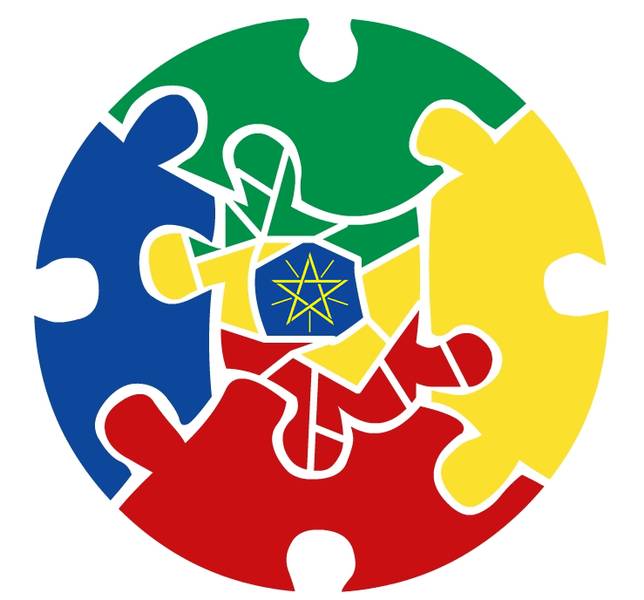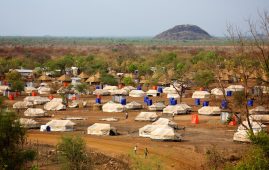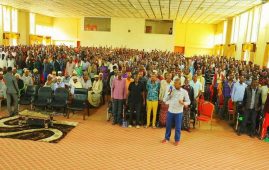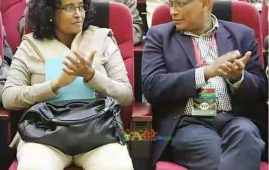Premising on the widely held view that the election is a lost battle for the opposition, not a few political commentators contend a post-election crisis is unlikely. Is that really, though? Is the likelihood of post-election crisis is contingent on how the opposition fare at the polls? A look at the previous elections and the makeup of the political landscape, reveals not only the likelihood of a crisis, but also the formula. Ethiopia conducted three national & regional elections, in 1995, in 2000 & in 2005. Each election witnessed an increase not only in the number of voters & voter-turnout, and in the number of candidates & parties, but also in the magnitude of post-election crisis. This is despite the fact that opposition parties ran for only a three-quarter of the parliament seats, leaving at least a quarter of the seats to the ruling party uncontested.
The knots-and-bolts are more or less the same; you only need to make some improvisations.
1/ Simulate a Coalition & Claim it is the Biggest Ever.
Create a coalition of parties and contend it is unprecedented. If you include well-known opposition politicians, the media & the diplomats will buy it. Don’t worry about the number of the parties, their dissimilarity, or the organizational strength of each. No one will judge the coalition by the number of parties in it. If the opposition were capable of such, there would not have been 60plus parties running to begin with. Don’t give chance to those who like to measure your standing by party membership & financial strength-simply evade such questions or claim ‘all Ethiopians would like to join us, had it been not for the repression.’ Don’t let ideological differences spoil the party. Getting rid of EPRDF is your shared objective – and that suffice. Just don’t publish any detailed political program/manifesto, rather focus on negative campaigning & make your electoral pledges hazy. And, of course, you should not forget to tag all other parties ‘EPRDF-affiliates’.
2/Galvanize Your Patrons
You cannot run a crisis and get away with it, unless you have an agitated youth, finance, media, & diplomatic support. The youth is ready anyway, let alone in a poor country. Just make proper use of existing networks of patronage and make wild promises. Ethiopian Diasporas will stir up if you tell them you are ready for violence, you are going to win, and you are big. And, assure them the government is at the brink of collapse. Reiterate sensational issues. Nationalist and racist issues always work if you tailor your message based on the audience. You do not need to worry much about the foreign media and the diplomatic community, they sympathize opposition parties by default. Just assure them of your unqualified acceptance of all neo-liberal ideals. To be on the safe side, try to create sense of guilt on the foreigners by accusing them for their assistance to the government, hopefully an altruist diplomat or journalist will pop up and rally for you.
3/Blame-It-All-On-EPRDF
Everybody expects an African government to rig an election including the media & the diplomats. You only need to provide them a few sound bites to backup their predisposition. Thus, make all sorts of allegations on the ruling party around the clock. If anything bad happens to members of your party, even if it is a lightning, blame it on EPRDF. If your candidates are wronged by any of the 200,000plus election officers, allege the officers are EPRDF members. No one would ask you for a proof, and the government cannot prove it otherwise. What kind of evidence can EPRDF produce to prove someone is not a member?
4/Make Birtukan Mideksa a Rallying Cry 
It doesn’t matter that Birtkuan Mideksa is not in the ballot box. Bereft of a political figure or a sensible agenda, you can count on a nice-looking, educated, baby-face imprisoned woman politician to serve as an icon of resistance. Since the government is unrelenting, making her an issue guarantees you a standoff. A non-compromising agenda is a sure way to create incidents. Just disseminate gossips claiming she is dead or about to die, and you will deliver your patrons a legitimate ground for violence and to disguise attempts of incitement. It may also help if you can provoke the prison guards to hit her mother or a known opposition politician; after all, they are aggressive anyway.
5/Stage a Row in Tigray – Perception Is Reality
Your patrons will not thaw their support lest you are alluring them with the prospect of regime change. They need to perceive the government is weaker, less cohesive, & indecisive. You well know, in politics, perception equates reality. So, staging an apparent row in Tigray Region will do. After all, you spent two decades telling everyone TPLF runs the country single-handedly. Just make sure that, in Tigray, the pre-polling, the polling & post-polling phases are marred by dispute and back it up with media allegations. Don’t worry about the fact that your chance to win TPLF in Tigray is remote. Just allege fraud in all the 33 constituencies there & drag the process as long as you can. It may also help if there is a media report of an incident even in some remote rural kebele, even though it is a minor one and non-political. You know how to amplify the event with rumors. You can hope that the radical elements in the opposition will perceive as if there is a power vacuum and, as a result, underestimate the legal repercussions of violence.
6/Amplify It with an Incident in Addis
An assassination of a high-ranking official or bombing a strategic institution will assure your patrons the government is at the brink of collapse. That helps to assure your patrons the security system is not that strong after all. If you manage to disseminate gossips claiming the incident is an inside job, you will be able to indicate the government is no more cohesive. The terrorist groups- Ginbot7, OLF, or ONLF, either individually or jointly, are more than happy to conduct such an attack. You only need to give political support and promise to include them in your government that you hope to form after the downfall of EPRDF. It suffices if you publicly defend that they are not terrorists and pledge to form an inclusive transitional government.
7/Campus Unrest – The Traditional Crisis Starter
You know the political symbolism traditionally attached with student protest. You may not be able to marshal the student body this time, as you used to. But, you do not need to worry. The public only needs to hear that there is some sort of disorder, perhaps a clash with the police, in a campus or two. You will back it up with gossips claiming the issues are political demands, like ‘release Birtukan Mideksa’ or ‘recount the votes.’ Obviously, the easiest tool to create disturbances in a campus at this time is a religious incident. You can count on the terrorist groups- Ginbot7, OLF, or ONLF for the field works. Just make follow up with media statements blaming EPRDF for the incident.
8/Fate and EPRDF will Lend You a Hand
You can justifiably hope that something else will go wrong. In a developing country like Ethiopia, something will always go wrong somewhere, even if there is no sabotage. A blunder by an official, inflation in some key consumption good, or anything may take place. Such a happening, though easily manageable at other times without much ado, may suffice for an incident when tensions are already high. You can also hope EPRDF will mess up something in its management of the post-election events, either by omission or by commission. Do your best to keep the government busy with all sorts of issues.
NOTE THAT: This article is written neither in support of a post-election crisis nor with the intent of accusing the opposition parties running in the election. I am simply musing at the likely developments of the election process. It may also serve as a precaution to the government and to the moderates in the opposition camp.
Daniel Berhane – April 15, 2010






